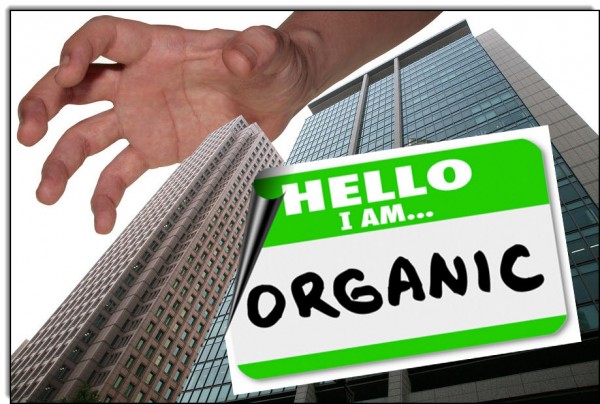
I believed in organic until last week, when my childhood friend Charlie Peller challenged me about organic labeling and I decided to do some research. Charlie cautioned, “You need to be careful when you read the labeling everything labeled organic is not necessarily organic and because you pay $3 or $4 more for a bottle also does not make it organic,” and it turns out he’s completely right.
Organic isn’t what I thought it was; most organic labels are owned by BIG FOOD; and the number of non-organic ingredients has risen from 77 to 250 in the past 13 years. The New York Times looked into the reach of corporations into organic foods in 2012. Here are some excerpts from that article:
Michael J. Potter (of Eden Foods) is one of the last little big men left in organic food…
Over the last decade, since federal organic standards have come to the fore, giant agri-food corporations like these and others — Coca-Cola, Cargill, ConAgra, General Mills, Kraft and M&M Mars among them — have gobbled up most of the nation’s organic food industry. Pure, locally produced ingredients from small family farms? Not so much anymore.
All of which riles Mr. Potter, 62. Which is why he took off in late May from here for Albuquerque, where the cardinals of the $30-billion-a-year organic food industry were meeting to decide which ingredients that didn’t exactly sound fresh from the farm should be blessed as allowed ingredients in “organic” products. Ingredients like carrageenan, a seaweed-derived thickener with a somewhat controversial health record. Or synthetic inositol, which is manufactured using chemical processes.
Mr. Potter was allowed to voice his objections to carrageenan for three minutes before the group, the National Organic Standards Board.
“Someone said, ‘Thank you,’ ” Mr. Potter recalls.
And that was that.
Two days later, the board voted 10 to 5 to keep carrageenan on the growing list of nonorganic ingredients that can be used in products with the coveted “certified organic” label. To organic purists like Mr. Potter, it was just another sign that Big Food has co-opted — or perhaps corrupted — the organic food business.
…Between the time the Agriculture Department came up with its proposed regulations for the organic industry in 1997 and the time those rules became law in 2002, myriad small, independent organic companies — businesses like Cascadian Farm — were snapped up by corporate titans. Heinz and Hain together bought 19 organic brands.
Eden is one of the last remaining independent organic companies of any size, together with the Clif Bar & Company, Amy’s Kitchen, Lundberg Family Farms and a handful of others.
“In some ways, organic is a victim of its own success,” says Philip H. Howard, an assistant professor at Michigan State University, who has documented the remarkable consolidation of the organic industry. Organic food accounts for just 4 percent of all foods sold, but the industry is growing fast. “Big corporations see the trends and the opportunity to make money and profit,” he says.
BIG FOOD has also assumed a powerful role in setting the standards for organic foods. Major corporations have come to dominate the board that sets these standards.
As corporate membership on the board has increased, so, too, has the number of nonorganic materials approved for organic foods on what is called the National List. At first, the list was largely made up of things like baking soda, which is nonorganic but essential to making things like organic bread. Today, more than 250 nonorganic substances are on the list, up from 77 in 2002.
… “After DHA (docosahexaenoic acid algae oil) got onto the list, we decided to go back and look at all of the ingredients on the list,” Mr. Kastel says. The average consumer has no idea that “all these additives are going into the organic products they’re buying.”
By 1996, he realized that the National Organic Program was heading in a direction he did not like. He said as much at a National Organic Standards Board meeting in Indianapolis that year, earning the permanent opprobrium of the broader organic industry. “They think I’m liberal, immature, a radical,” Mr. Potter says. “But I’m not the one debating whether organics should use genetically modified additives or nanotechnology, which is what I’d call radical.”
What we can do about the secretive incursions into the world’s healthy food stream by Big Ag and Big Food is: fight tooth and nail against the TPP which will give corporations an amazing amount of control over our lives, economies and politics … not allow Big Money to take over and eliminate our internet freedoms … and support truly healthy food by buying from local farmers and growing our own.
I’d love to hear the ideas you have for fighting back too.